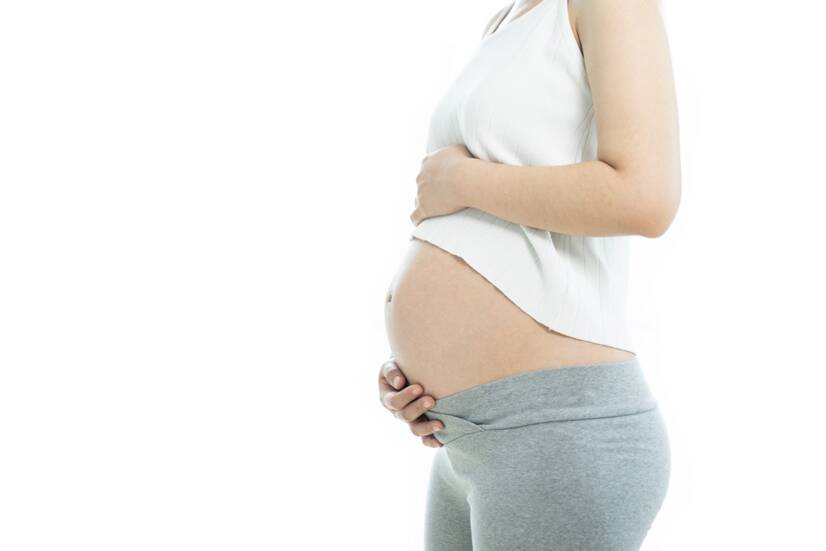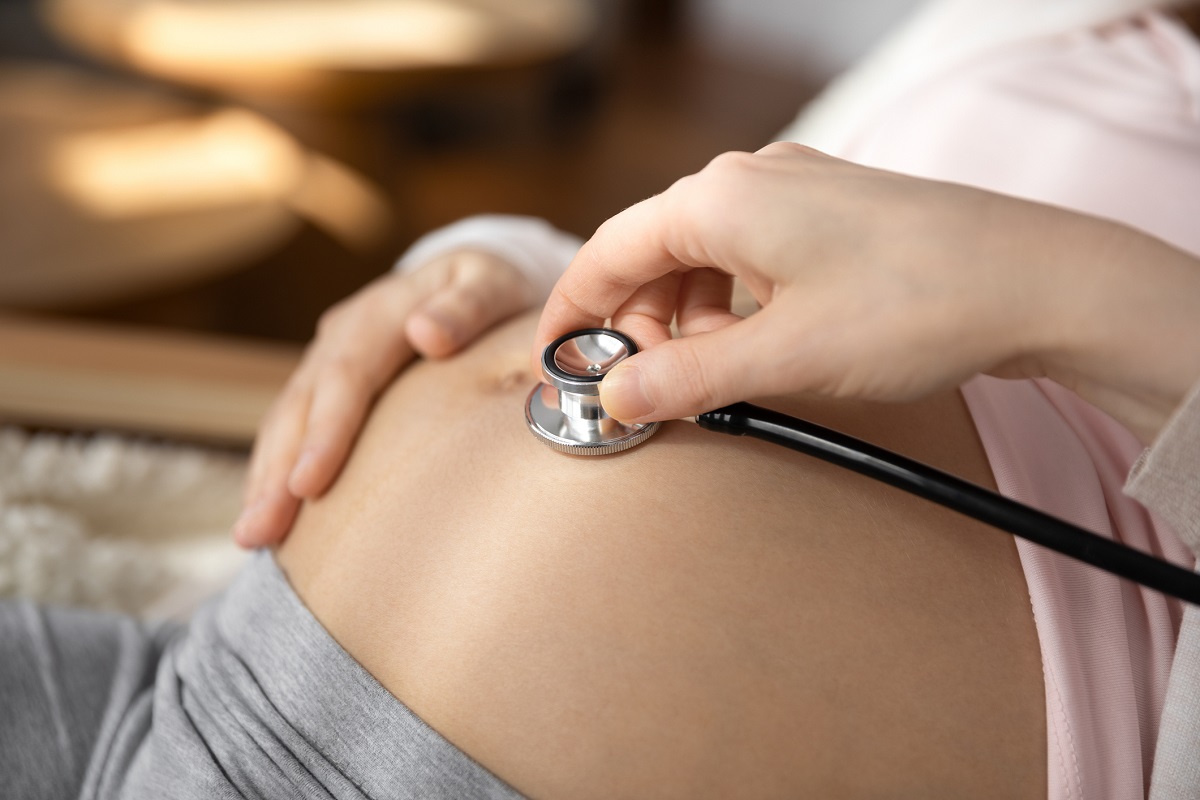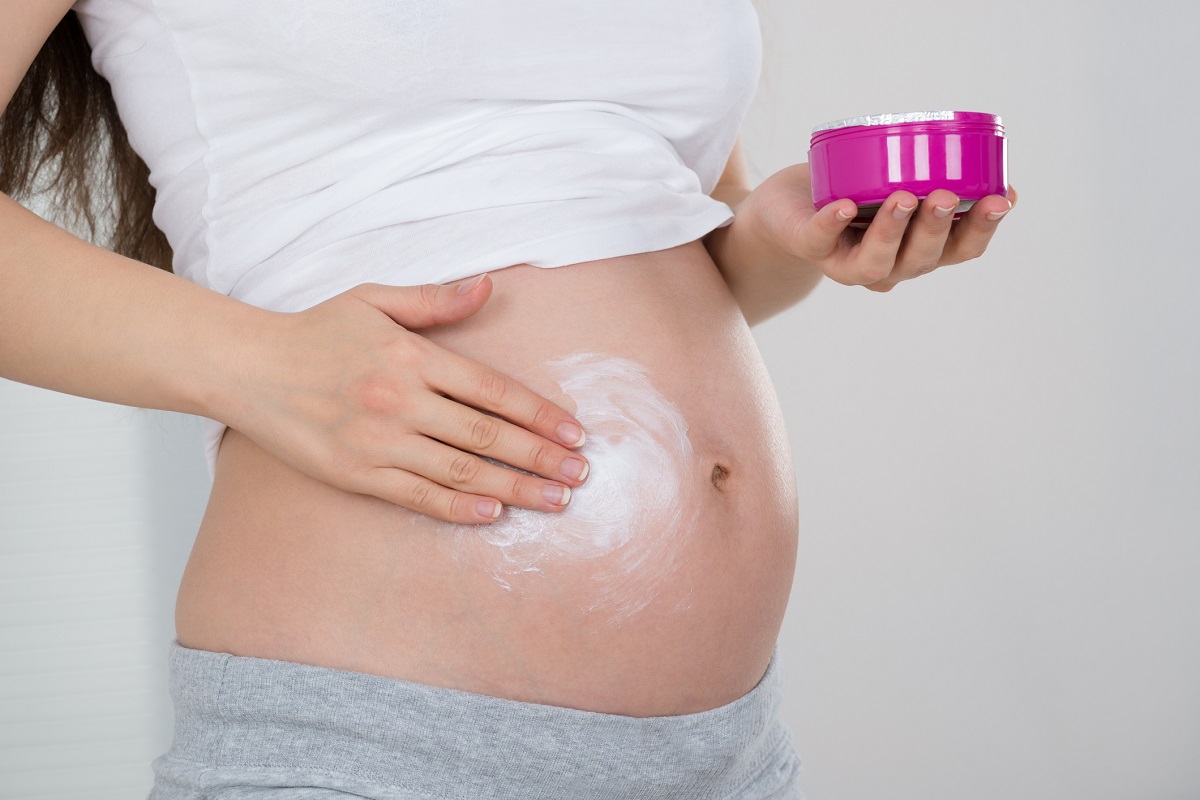- healthline.com - 22 weeks of pregnancy: symptoms, advice and more
- whattoexpect.com - 22 weeks of pregnancy
- nhs.uk - Week-by-week quide to pregnancy
- verywellfamily.com - 22 weeks pregnant
22nd week of pregnancy (TT). Has the fetus already developed all the organs?

The child sleeps less and moves more during the day. When he wakes up, he is very active and makes his movements known.
Article content
TT 22: You are 22 weeks pregnant and you are starting your 6th month of pregnancy. You have 18 weeks of pregnancy left.
Your baby has undergone rapid development. He already resembles a newborn, although his length is about 27-28 cm and his weight about 380-430 g.
There is a period of growth and deposition of subcutaneous fat that will continue until delivery.
The foetus moves regularly in the womb, changing its position and moving its limbs independently. It touches everything around it, grasps its hands, crosses its arms and can grasp the umbilical cord firmly with its hand.
How is your baby developing in your tummy?
The development of all the organs is being completed so that they can function properly after birth.
The brain is developing at a great speed.
The baby's lungs are developing. He's already practicing breathing exercises.
A baby's heart can already be detected with a stethoscope. Its heart beats at an average rate of about 110-160 beats per minute. In an adult, it averages 60-100 beats per minute.

The liver starts making enzymes.
The eyelids and eyelashes are developing, and the delicate eyebrows and nails are already visible.
The tear ducts are also developing.
The iris is beginning to colour.
The fetus develops all the layers of skin and sweat glands form.
The skin turns red and the slow deposition of subcutaneous fat begins.
The body is covered with fine hairs (lanugo) that help to keep vernix (sebum) on the skin. This prevents it from sweating and cracking.
The skeleton is further strengthened by the deposition of calcium in the bones and teeth taken from the mother's body.
The baby swallows amniotic fluid. Some of the amniotic fluid is excreted by the villi and some is stored in the intestines. It is expelled from the intestines after birth as a sticky dark stool called tar.
The taste buds continue to develop. The baby can taste the amniotic fluid, which is affected by what you eat. Therefore, try to eat a healthy diet.
His sense of touch is developing. Sight and hearing are getting stronger.
Your baby perceives light and dark and begins to sense and process sounds from his environment, such as your bowel movements, your heartbeat, your breathing and your voice.
In boys, primitive sperm have formed in the testicles.
The table shows the approximate dimensions of the fetus at 22 weeks as measured by sonography
| Total length | Weight | HC Head circumference | BPD Transverse diameter of the head | AC Abdominal circumference | FL Femur length |
| 27.8 cm | 430 g | 196.3 mm | 55 mm | 169,6 mm | 36,7 mm |
For more information on fetal size, see the article:
What is fetal biometry? Ultrasound in pregnancy - fetal size?
How does a woman feel at 22 weeks of pregnancy?
You are probably feeling your best at this time. The morning sickness has subsided and the size of your tummy is not yet preventing you from any activity.
You may feel an increased energy supply.
You can probably already feel the baby's movements. This improves your mood even more.
You can feel the uterus about 1 cm above your belly button. It will grow rapidly from now on.
The tummy is already attracting attention and becoming unnoticeable.
Some mums-to-be may start to feel mild, painless hardening of the abdomen, caused by weak contractions (contractions) of the uterine muscles. Normally, these start from week 6 of pregnancy. You just haven't felt them yet.
These contractions are triggered by the growth of the uterus and also by the growth of the fetus.
It is the hardening of the abdomen that is one of the common complications in pregnancy.
You may notice abdominal hardening after a lot of exertion, at irregular intervals. Inform your gynaecologist about abdominal hardening.
If the hardening starts at regular intervals and increases in intensity, visit the nearest hospital. This can prevent premature labour.
Heartburn can bother you from the first trimester, for others it comes only in the second trimester.

Why do you get heartburn?
Heartburn is one of the symptoms of pregnancy.
In early pregnancy, it is caused by the hormones progesterone and relaxin. Progesterone and relaxin relax the smooth muscles, and thus the muscles in the digestive tract and stomach.
Food is processed more slowly. Stomach upset, indigestion, bloating and heartburn result.
But slower digestion has an advantage for the baby. When nutrients are better absorbed into the bloodstream, they pass through the blood into the placenta. From the placenta, the baby takes them in.
With heartburn, the stomach sphincter, which prevents food from returning to the esophagus, relaxes and gastric juices pass from the stomach into the esophagus.
Stomach acid, as it passes into the oesophagus, irritates the mucous membrane with its acidity. It causes an unpleasant sensation of heartburn.
Slow digestion, irregular bowel movements and pressure of the uterus on the bowel can cause irregular bowel movements. This leads to constipation.
Constipation and pressure on the stool can cause hemorrhoids.
For more information about haemorrhoids in pregnancy, see the article:
Haemorrhoidsin pregnancy and after childbirth
The hormone progesterone increases blood flow through the placenta to the fetus. This ensures that the baby is adequately nourished. But progesterone causes lower blood pressure. This can cause dizziness.
Swelling of the lower limbs, especially in the ankles, occurs.
You may begin to experience feelings of pressure on the pelvis due to the pressure of the growing uterus. Sometimes these are accompanied by pain in the sacrum.
Difficulty falling asleep and staying asleep may be uncomfortable due to the discomfort of finding the right comfortable position for the protruding abdomen. Your sleep may also be interrupted due to too much thinking and fear of the arrival of the offspring.
Swollen and bleeding gums appear.
Headaches can be caused not only by pregnancy hormones, but also by hunger, thirst and lack of sleep. Before you reach for the pill, try to drink, eat, rest or sleep.
You may be surprised by hot flashes during the day.
In pregnancy, there is an increased risk of urinary infections. They are manifested by burning and stinging during and after urination. When these problems occur, see your gynaecologist who will prescribe gentle medication for you and your baby.
Be especially careful when drinking urological tea or herbal tea. Not all herbs are recommended for use in pregnancy.
In addition to urinary tract infections, there is also a risk of vaginal infections, which are manifested by a change in the consistency or colour of the discharge or its smell, itching or burning in the genital area.
Leg cramps occur most often at night and are often caused by calcium and magnesium deficiency.
Stretch marks may begin to appear, on the hips, thighs, abdomen and breasts. Use moisturizing creams and massage the skin regularly to reduce them.
Pain under the ribs is common, especially towards the end of pregnancy. Even now, some mothers experience it. It occurs especially when sitting. The uterus presses on surrounding organs such as the intestines, stomach or diaphragm.
Your feet and legs ache. If you notice a swelling in your calves, it's because of the swelling. Your feet start to ache because of the effect of the pregnancy hormone relaxin, which relaxes the ligaments and joints not only around the pelvis but also in the feet.
What can you notice?
Changes in vaginal discharge are typical for this trimester.
You can find out more about what the discharge should be like in our article:
Discharge in pregnancy. What is considered normal discharge?
You may notice an increased appetite for sex due to the hormone estrogen, which circulates blood to the pelvic area and your breasts. Many women enjoy sex with their partner more during this period of pregnancy than before pregnancy.
You may already be starting to feel gentle contractions, known as Braxton Hicks contractions or errands. They manifest as a weaker hardening of the abdomen. The uterus is preparing for labour in this way.
The actual contractions will be painful and will come at regular intervals. However, with messengers there is no back pain, no amniotic fluid drainage or vaginal bleeding.
If you experience amniotic fluid leakage, vaginal bleeding, or sharp pain in the lower abdomen, visit the nearest hospital immediately. These may be signs of impending premature labour.
Your abdomen is growing and your navel is starting to bulge outwards.
You're proud of your round, pregnant belly. You're happy because you know your baby is developing inside it.
However, your joy can be spoiled by the appearance of stretch marks, which appear as red to burgundy blood vessels on your belly.

Your hair is beautiful, thick and full of shine because it is supplied with nutrients.
Advice in the 22nd week of pregnancy
No special tests await you in this week of pregnancy.
Your blood pressure will be taken, your weight will be recorded, your urine will be checked for the presence of protein in order to catch the possible occurrence of pre-eclampsia. The condition of the cervix, the tension of the uterus and its growth will be checked.
What can we recommend?
- For heartburn, try chewing sugarless gum for at least half an hour after eating. This will increase the production of saliva, which neutralises gastric juices. Another option is to reach for nuts or almonds or almond milk after eating, which also neutralise gastric juices.
- When you are constipated, increase your fiber intake and try adding whole grain breads, oatmeal, dried and fresh fruits, and plenty of fluids. Eat smaller portions of food several times a day and try to get plenty of exercise. When you need to have a bowel movement, don't hold it in.
- Don't forget to exercise and go for regular walks. Regular exercise is also beneficial for pregnant women. It strengthens your body and prepares you better for childbirth.
- Strengthen your pelvic floor with Kegel exercises.
- Eat healthy, limit salted and fried foods.
- Increase the calcium in your diet, which is taken from your body to the fetus and strengthens your bones.
- Take pregnancy vitamins, which contain all the ingredients needed for healthy fetal development.
- Get plenty of rest and don't overwork yourself. Try to do everything calmly. You won't miss out on household chores.
- Get enough sleep.
- Take extra care of your skin and the skin that needs it now. Use creams and massage regularly, especially in areas where stretch marks are more likely to form.
- Avoid chemicals such as cleaning products and hair dyes. Chemicals can pass through your skin into your bloodstream and reach the fetus.
For more information about the other weeks of pregnancy, see the summary article:
Pregnancyby weeks. How does pregnancy and fetal development work?
Other interesting articles about pregnancy
- What is pre-eclampsia? Does it pose a risk to pregnancy? Symptoms up to eclampsia
- How to recognize pre-eclampsia and its symptoms in pregnancy? Know the risks
- Sex in pregnancy. What to watch out for and what changes does it bring?
- Stretch marks in pregnancy not only on the abdomen? Do you know when they arise?
- What causes it, the symptoms?
- Sweating head in pregnancy: at the beginning and as a symptom, what else does it mean?
- What to do with constipation and how to defecate without difficulty?
Gallery



Interesting resources
Related










